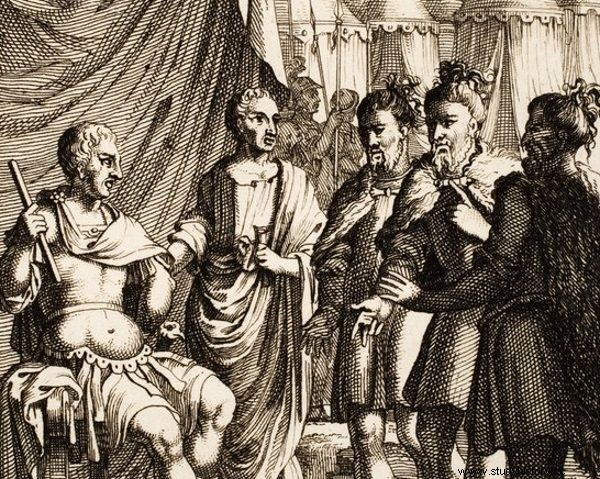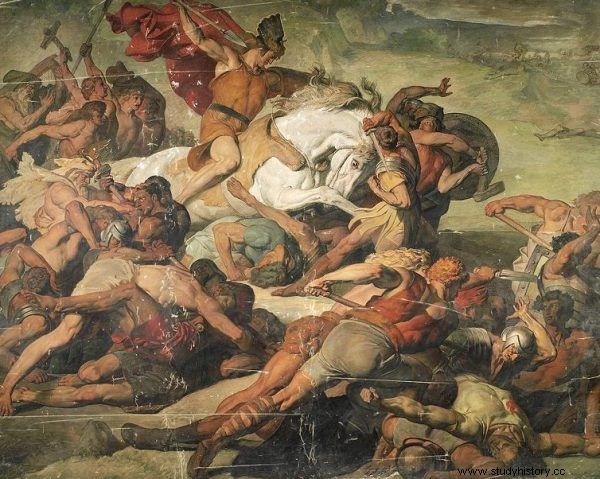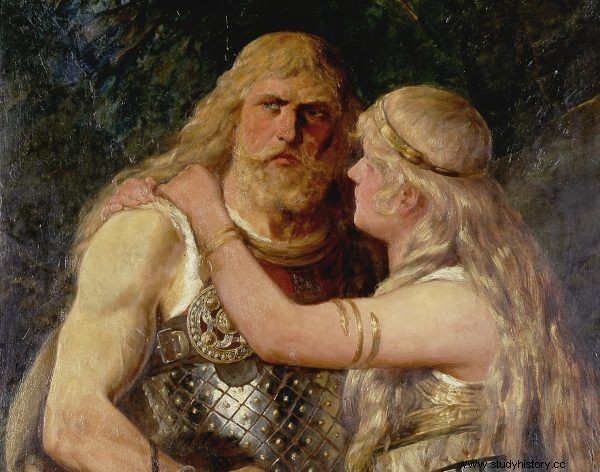On the news of this defeat, Augustus reportedly banged his head against the wall, shouting:"Quintilius Varus, give up the legions!". There was panic in Rome. After all, an easy victory was expected - while 20,000 legionnaires died in agony, falling into a trap organized by a barbarian leader.
The defeat of the Roman legions in the Teutoburg Forest in AD 9 caused a shock among the inhabitants of the Eternal City. The writer and historian Suetonius described the reaction of Emperor Octavian Augustus:
On the news of this defeat, Augustus ordered guards to be posted around Rome, in order to prevent panic, he extended the military office of the existing governors in the provinces so that the power over the allies would remain in the hands of experienced and knowledgeable people with the local conditions (...) Finally, he was allegedly so depressed that did not shave his beard or cut his hair for several months. More than once he banged his head against the wall, shouting aloud:"Quintilius Varus, give back the legions! ”
The total destruction of the three legions in practice meant the end of the Roman expansion to the North-East. At that time, fierce battles with the Germans for the capture of the right bank of the Rhine had been going on for over twenty years. Despite numerous difficulties, there were many successes in the course of them. Lucian Domitius Ahenobarbus even crossed the Elbe, becoming the first and only Roman commander in history to reach this far northeast.
Encouraged by the success of the emperor, he wanted to create a new province - Rhine Germania (Great Germania). The accomplishment of this task was entrusted to an experienced diplomat, Publius Quintilius Varus, who previously managed Africa and Syria. He was also famous for his successful intervention in Judea in 4 BC, where he quelled the serious unrest after the death of Herod the Great. It seemed that there was little that could prevent the Romans from consolidating their power in the new territory. It turned out, however, that during the war, nothing can be considered a foregone conclusion.

Augustus wanted to consolidate Roman rule in Germany and create a new province.
Arminius, the commander of the Cherusks of the Germans, unexpectedly stood up against the Romans. Born around 17 BC, the son of the leader of Sigimer, he grew up in the Eternal City. It was there after the defeat of the Germans during the Druzus campaign, i.e. around 8 BC. He received classical Roman education, he also received citizenship and the title of equality. Before he turned against the empire, he served in the legions - he fought in Pannonia (today's Hungary) and in Germania under Tiberius. For the Romans, was an example of a Romanized barbarian aristocrat - until it seemed that he had much more ambitious plans for himself .
Year 9 campaign
Varus was expected to deal with both the resistance and stubbornness of the indigenous tribes in the newly emerging province. It was hoped that he would use his diplomatic talent, supported by the seriousness of five legions, to apply the principle of divide et impera . It was supposed to keep the existing allies, convince the undecided, and keep the defeated in check. It was assumed that his mission would not be of a military nature, like the earlier campaigns of Druzus and Tiberius.
Varus soon realized, however, that the governance of the East and the laying of the foundations of state structures in the wilderness of Germany did not have much in common. He spent his first year collecting taxes and introducing Roman law in a very subtle way, which was badly received by individual tribes. The imperial governor, who moved around the provinces, settled disputes and received envoys, quickly alienated the local aristocracy, which became water for Arminius' mill.
The goal of the rebellious leader was to start a German uprising and, at the same time, to strengthen his position among Cheruski . He could do this only after winning a significant victory over the Romans. The fact that he knew the tactics of the legions perfectly well and that he had previously acquired Varus' favors made the matter easier for him. He managed to persuade the legate to go to the lands of the officially Roman-friendly Cheruski tribe and to set up a summer camp there. He then wanted to lure the legionnaires out of the camp and drag them away from the river - they marched along the Rhine's tributary, the Lippe, aided by a small flotilla. If they had followed the same route across the Rhine, an impact, even by surprise, would be risky and difficult to prepare.
Meanwhile, September was approaching, and Arminius knew that the Romans would soon end their stay in Germania. He did not want the opportunity to start an uprising to be lost. So he orchestrated the attacks of his allies, including the Brukters, on the Cheruski lands and began to convince the Roman commander that this was a unique opportunity to strengthen the structures of the new province. He encouraged him to try to convince the undecided to cooperate with Rome, punish the aggressors and quell any unrest.
No doubt the opponents of this plan have argued that it is too late to go against the rebels. They were afraid that this would prevent them from returning to their winter positions before the start of winter. However, Arminius did his best. Varus believed him that it would be enough to take the shorter path indicated by the Cheruski, and it would be easy to defeat the enemy, and then return to the Rhine in glory.
In the forest of blood
The Romans left the summer camp at the beginning of September. On the same day, Arminius also departed with most of his cavalry, officially to gather the warriors and join the marching column soon, and in fact - to coordinate the attack. Importantly, he left guides with the legionnaires, who made sure that the troops followed the previously established route and did not turn back south.
The legionaries received their pay, the caravans were prepared and they were on their way. As a rule, as much as 26 kilometers were traveled a day. The Roman army, despite the depletion of its forces by allocating garrisons to the forts, had about 14,000 soldiers in the marching column (excluding civilians) and stretched approximately 15 kilometers .

Varus was convinced that he could defeat the rebellious tribes before winter.
The march was slowed down by a sudden attack by the Brukters, which is believed to be the beginning of the battle. At the same time, the weather deteriorated. The Romans, constantly harassed by the enemy, entered the wooded area in the pouring rain. When a favorable place was found, a camp was built, and in the evening Varus called a council of war. The next day, most likely due to the terrible aura, the legionaries remained in the camp. Scouts were dispatched to find out where Armenius was. His betrayal was still not suspected.
Certainly, the intelligence mission was successful, because the Cheruski were closer than expected, but the legionaries were received by the Germans quite differently than they had expected. In the evening, Varus and his commanders had to realize the seriousness of their situation. This is indicated by the change in the way we move:it was decided to start in the morning, regardless of the conditions. Tabor was ordered to be burned or abandoned and only the most necessary equipment was taken. It was also intended to reduce the extension of the marching column. In view of the increasingly probable betrayal of Arminius, the only option was to try to break through to the west, and eventually, in a favorable area, to fight the enemy in a general battle.
When the Romans left the camp on the third day as planned, the barbarians, hidden in the thicket of the forest, resumed their persistent attacks. They often lunged violently, breaking the column into smaller groups and increasing the distance between the marchers. The fights were fought mainly by auxiliary units and cavalry, moving with difficulty in the forest backwoods. Meanwhile, the heavy infantry tried to continue their march.
Losses in the legions grew, and discipline and organization began to loosen. A few kilometers from Kalkriese, on a hill near the village of Schwagstorf, the soldiers of the Eternal City went out into the open and most likely set up another camp. It is difficult to reconstruct what happened in the following hours, but it is indisputable that at this stage they realized that they were circled and had only one direction left to march . There had to be more attacks as well, and Arminius' troops joined the fight. Drive lost. Finally, the wounded Varus committed suicide.

The legionaries were surrounded by Germanic tribes.
However, we do not know in what order these events took place. There are more question marks. Did the battle last three or four days? Did the Romans manage to set up a new camp or did they run out of time? Did Numonius Wala, the cavalry commander, escape from the battlefield, or was he trying to break through north on the orders of the commander in chief? Was it the defeat of the car, crushed by the Cheruski, that finally broke Varus? Or maybe it was the appearance of Arminius that overwhelmed the bitterness?
After the suicide of the governor, many senior officers followed suit. We can suspect that some of the rank and file also followed them. The cruelty of the Germans was well known and they did not want to hit them alive. On the same day (or, as some say, on the fourth day of the battle at dawn), the remnants of the legions led by Lucius Eggius and Ceylon made an attempt to continue their march towards the west. When the head of the army, led by Eggius, after descending the slope, reached another forest, the Cherusk commander launched a violent attack on the ariergard, led by Ceylon. Another part of the army has been smashed.
The end of the conquest
Some of the survivors rushed towards Eggius' army. The rest, along with Ceylon, returned to the camp, where they capitulated to the Germanic commander, sealing their fate. At that time, the commander of the front troops realized that his path was leading along a fortified rampart manned by the Germans. He made a desperate attempt to break through the dam - without success. The Romans were attacked from the left and right flanks. Finally, Arminius completed the lap from behind. The legionaries had no chance of being saved .

Arminius gave the Romans no escape route.
In the fighting, the Eternal City lost three legions:the 17th, 18th and 19th. Emperor Augustus, shocked by the defeat, forbade their reproduction. About 20,000 people died on the Empire's side . Many of those who were captured also perished, and in agony. They were tortured and sacrificed. Varus's body was unearthed, and Arminius sent his head back to his great rival, Marbod, the Marcomannic commander. We do not know whether this gesture was a flick for a competitor or a call to raise a rebellion following the example of the Cheruski and their allies. Marbod's only reaction was to send the hapless commander's head back to Rome.
The news of the defeat ignited the fire of a general uprising. Roman camps, forts and settlements were attacked and destroyed in Greater Germania. Who could have fled the Rhine. The idea of conquests in the northeast was abandoned - the border settled on the river and survived until the fall of the empire. The defeat became a legend. The Germans took pride in it even after many centuries - it undoubtedly strongly influenced the development and character of 19th-century German nationalism.
Studies:
- Delbrück H., Ancient Art of War, Volume III. Roman Empire and Teutons , Napoleon V 2013.
- Goldsworthy A., Pax Romana , Rebis 2017.
- Iwaszkiewicz P., Łoś W., Stępień M., Lords and leaders of antiquity. Dictionary , WSiP 1998.
- Krawczuk A., Emperor Augustus , Ossolineum 1973.
- Matyszak P., Enemies of Rome , Bellona 2007.
- McNally M., Battle in the Teutoburg Forest , Osprey Publishing 2011.
- Rochala P., Teutoburg Forest 9 CE , Bellona 2005.
- Southern P., Octavian August , PIW 2003.
- Ziółkowski A., History of Rome , PTPN 2005.
